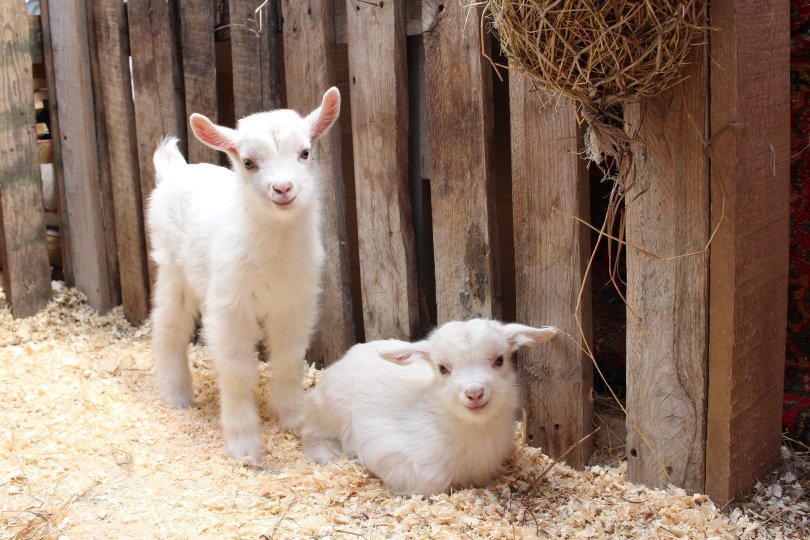If you are a farmer or have recently acquired a baby goat, you may be wondering what to feed them. Providing baby goats with the right care, shelter, maintenance, and diet are crucial to ensure that they become healthy adults in the future.
Fortunately, baby goats’ diets are generally uncomplicated and easy to provide. The life stage of your baby goat will affect the type of food they should be fed starting with milk and later hay, plants, and weeds. In the case of a newborn goat, you may even need to bottle feed them.
In this article, we will cover all the information you need to know about feeding your baby goat a high-quality diet to ensure that they can grow and develop properly.

Identifying Your Baby Goats Life Stage
To start, a baby goat is referred to as a ‘kid’, and it is what most farmers and agricultural veterinarians will call baby goats, so we will refer to baby goats as a kid throughout some parts of this article. If you are new to farming and baby goats, then this may not be something you may have known.
If your mother goat has recently given birth, then her offspring is considered a newborn. They are in their earliest life stage and will not be able to eat solid food until they are around six to eight weeks of age. During this time, the baby goat will have been weaned from their mother and solid foods can be gradually introduced into their diet.
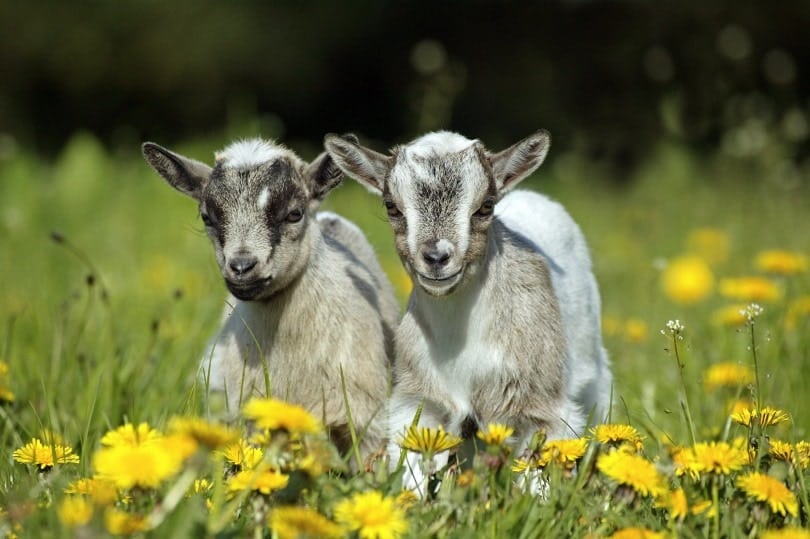
If the newborn goat does not feed on the mother, you must start feeding them colostrum through a bottle. Colostrum naturally comes from the mother and is high in nutrients and immune-building properties. You can purchase agricultural milk replacement from your local agricultural feed store which contains high amounts of colostrum.
After eight weeks, your kid is ready to eat solid foods and refuse milk. Their diet will vary in comparison to adults, as their solid foods should be rich in nutrients to accommodate your baby goat’s essential growth stage.
How to Bottle Feed Baby Goats
If you do decide to bottle feed your newborn goat the first step is to positively introduce them to bottle feeding. Start by squeezing the bottle into their mouth until a bit of milk comes out. This will help them associate the bottle with milk and therefore encourage them to drink from the bottle.
Newborn goats should be fed up to four times a day for the first few weeks. After they are a month old, you can begin to reduce feeding to three times a day. With the help of an agricultural veterinarian, you will be able to monitor the exact amount of minerals and other supplements to add to the milk’s mixture. Late kids can be fed goat’s milk from another nursing or pregnant mother, lamb-milk replacer, or cow’s mild. If you decide to feed the kid fresh milk, the milk should be pasteurized or purchased from stock that is certified to be free of the encephalitis (CEA) virus, paratuberculosis, and mycoplasmas, and in some cases heat treatment may be necessary.
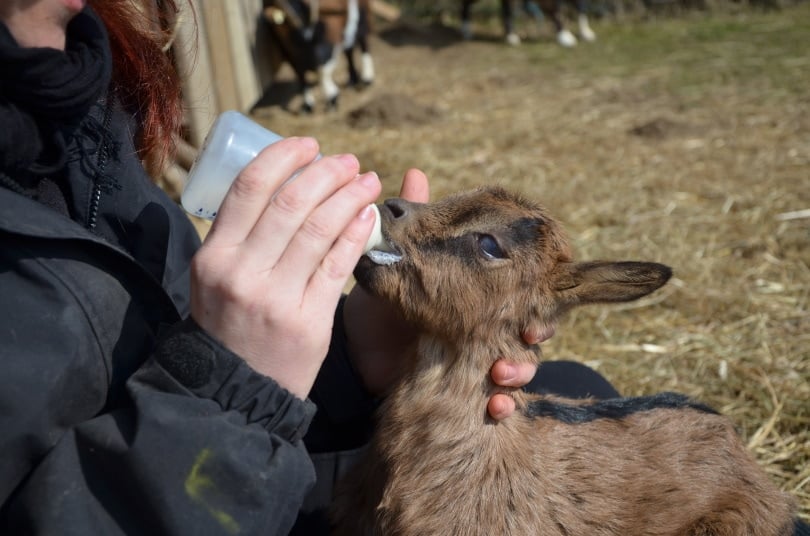
These items are essential when you are bottle-feeding a newborn goat:
- A baby bottle suitable for baby goats and other farm animals
- Lamb or goat nipple teat
- Goat milk replacement formula (We recommend Manna Pro Milk Replacer with Probiotics to get started)
- Colostrum replacement powder
- Supplements provided by an agricultural veterinarian
Newborn goats should be fed between 10% to 12% of their body weight per day and should be provided with sufficient milk or milk replacer within regular intervals to achieve optimal growth.
What Do Baby Goats Eat?
You can determine if a baby goat is weaned when they start to prefer solid foods over milk. Baby goats should have access to grain-based creep feed and hay as early as one week of age, but they will primarily drink milk during this time.
A baby goat’s primary diet consists of around 80% of high-quality hay, and 5% should consist of goat feed grains. The remaining percentages of a baby goats’ diet should consist of pasture, weeds, and hay pellets. It is important to note that goats are ruminants, which means that they have a four-chamber stomach. Roughage is necessary to help the rumen function properly.
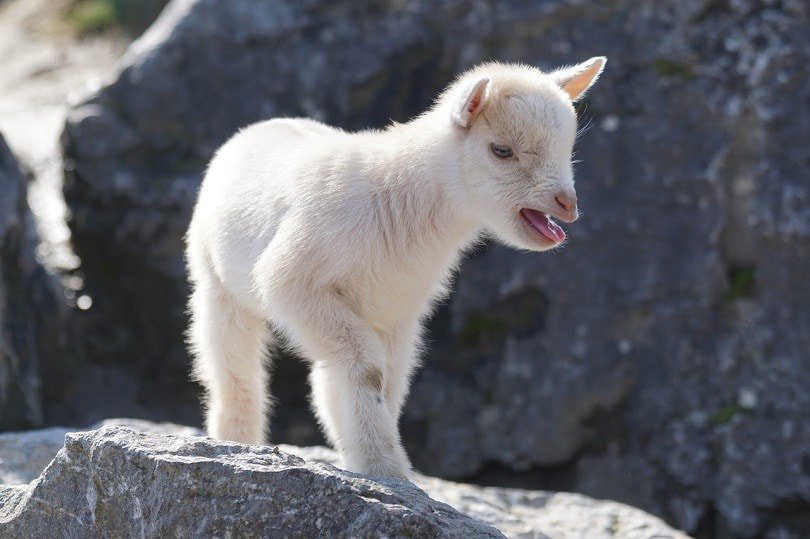
After your kid has been weaned, other solid foods should slowly be introduced into their diet to avoid digestive issues such as bloating. It is very common for your baby goat to experience constipation or diarrhea due to fast dietary changes. Hay pellets may be a good idea to feed to young baby goats before introducing them to fresh roughage. This is because hay pellets are a more easily digestible form of hay.
Here is a quick rundown of a baby goats’ diet after eight weeks of age:
| Hay (or hay pellets) | 75-80% |
| Goat feed (grains) | 5% |
| Pasture | 5% |
| Weeds | 2-5% |
Safe Plants and Weeds for Baby Goats
Baby goats are browsers and although many people believe they can eat anything, there are certain foods you should avoid feeding your baby goat as they may be poisonous, and there are also certain foods that many farmers and agricultural veterinarians recommend.
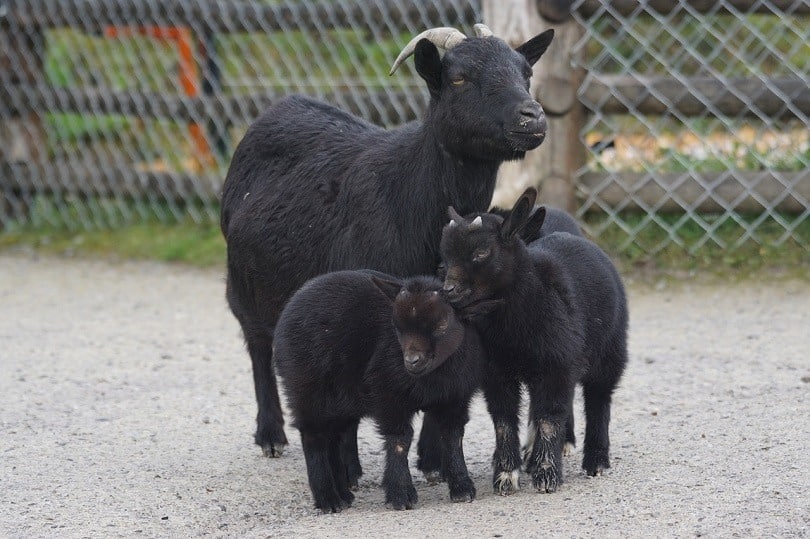
- Fresh grass
- Clover
- Dandelions
- Maple leaves
- Roses (leaves, hips, flowers)
- Blackberries
- Kudzu
- Apple leaves
- Musk thistle
- Horseweeds
- Burdock
What Foods Should You Avoid Feeding Baby Goats?
It is important to not keep your baby or adult goats in a pasture where azaleas or rhododendrons are growing as these plants are poisonous to goats. In addition, feeding baby goat old food that has been sitting in the heat or gathering moisture may grow mold that can cause your baby goat to fall ill. Care should be taken to ensure that your baby goat’s main feed is stored correctly and replaced when necessary.
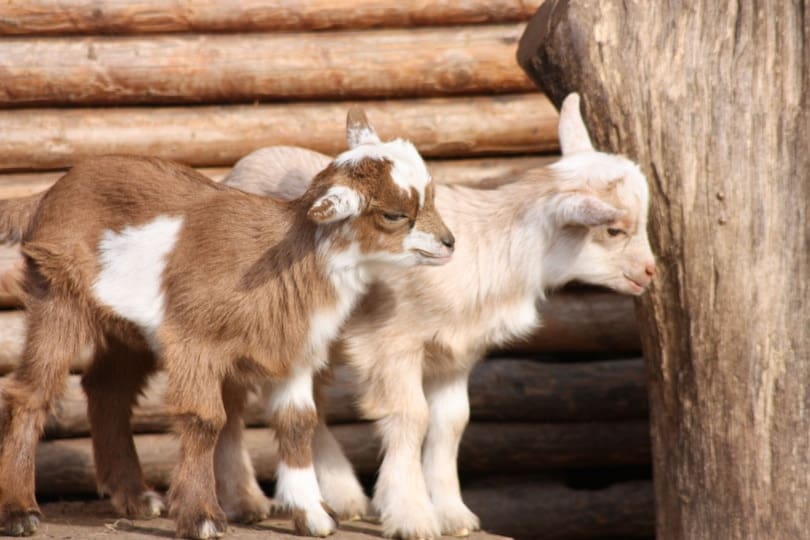
Avoid Feeding (Warning):
- China berries
- Dog fennel
- Pokeweed
- Redroot
- Bracken fern
- Eastern Baccharis
- Honeysuckle
- Crotalaria
- Virginia creeper
- Black cherry
- Pigweed
Take caution to ensure that the pasture is free from all poisonous plants as they can harm your goat. Baby goats are curious and will eat most plants and weeds growing in the pasture. Contact your local agricultural veterinarian if you suspect your baby goat may have consumed a poisonous plant. Take a sample of the plant with to the veterinarian so that the right treatment can be administrated.
- You may also want to read: Can Goats Eat Bananas? What You Need to Know!

Final Thoughts
Feeding your baby goat is easy once you understand their basic dietary requirements. The main concern when it comes to feeding kids is to ensure that the diet is balanced and suitable for their life stages. A baby goat fed correctly will grow to be a healthy and proportionate adult with a hearty appetite. Feeding your baby goat is a rewarding experience, and their eagerness to feed is admirable by many owners.
You May Also Like:
- Can Goats Eat Cucumbers? What You Need to Know!
- Can Goats Eat Cabbage? What You Need to Know!
- Can Goats Eat Strawberries? What You Need to Know!
Featured Image Credit: AllaMosurova, Shutterstock
